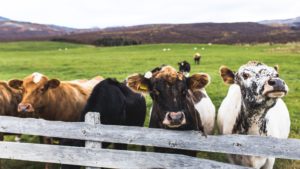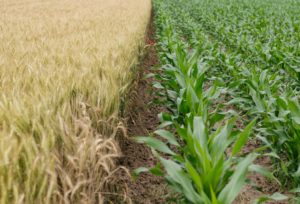This “Movement”
by: Guest blogger Rodger Wasson, owner of Idea Farming and creator of The Farm to Table Talk Podcast.
Food can be more efficiently and justly produced in some fashion everywhere but not in the same fashion everywhere. It will need to be both globally distributed (oranges don’t grow well in North Dakota) and local. The “Ponics”, Hydroponics, Aquaponics and other new ‘farm-in-a-box’ systems will disperse production to rooftops, deserts, suburban work campuses, health care organizations, backyards, snow-belts and impoverished villages in the third world.

Land-based systems can conserve and regenerate any over-farmed soils. There will still be a place for grain crops to feed animals even when pasture and range grazing is optimized. CAFO’s (Concentrated Animal Feeding Operations) will become more transparent, humane, environmentally neutral, antibiotic restricted, employee fair systems or be displaced. Agroecological, Biodynamic, Organic and responsible large scale conventional will all be needed. Genetics will matter but will be less GMO for pesticide resistance and more gene mapping and ‘switching’ that can even be utilized for Organic or other sustainable systems–reducing the use of synthetic fertilizers, pesticides, water and carbon producing fossil fuels. And technology will advance useful tools for large or small and rich or poor.
 Along the way to the future important questions must be answered. Why don’t we grow more cauliflower and less corn? Because it doesn’t take much to meet the current consumer need for cauliflower and it takes a lot of corn for animal feed, ethanol, sweetness and other food ingredients. Policymakers will have to face whether subsidies are wisely invested for fuel, row crops or specialty crops. The integrity of the global food system must offer food safety, environmental protection, and food justice from proud countries. That earned pride deserves to be labeled for country of origin.
Along the way to the future important questions must be answered. Why don’t we grow more cauliflower and less corn? Because it doesn’t take much to meet the current consumer need for cauliflower and it takes a lot of corn for animal feed, ethanol, sweetness and other food ingredients. Policymakers will have to face whether subsidies are wisely invested for fuel, row crops or specialty crops. The integrity of the global food system must offer food safety, environmental protection, and food justice from proud countries. That earned pride deserves to be labeled for country of origin.
To simply argue that GMO crops or Organics or whatever are the answer, misses the point. Multiple approaches can be implemented responsibly and sustainably in fair systems that range from large to small and for rich and poor. That really is a Movement.
 Rodger Wasson
Rodger Wasson
Idea-farming
www.FarmToTableTalk.com
The Farm To Table Podcast fosters conversations with pioneers and leaders of the food movement from all sides and perspectives—often finding there is more than one way to “better.” Depending on who we speak with and what their stance is on issues like organic, GMOs, large scale vs. small and local, pesticides, regulations, etc we’ll hear comments arguing the opposite. This is good! The goal is to elevate the conversation. Our belief is that everyone can do better, but that all of us can also learn and find a way to help improve the food system.






